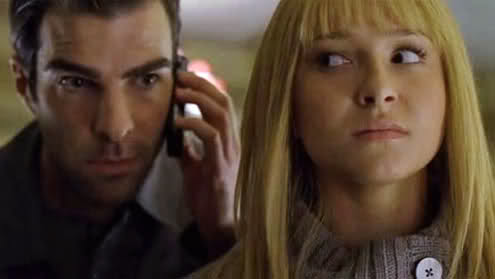By the time 2006 had rolled around, we were full steam into the era of comic book film adaptations. Sam Raimi’s Spider-Man franchise and Bryan Singer’s X-Men films were tearing up theatres. Christopher Nolan had only recently took command of the box office with Batman Begins, the reboot that reinvigorated Batman films and set a new bar for these prolific adaptations. And Sin City showed that big Hollywood productions taking from the comic book world didn’t have to be superhero epics to succeed.
There was also some crap like Daredevil but we’re all in counselling to come to terms with that.
[related_content slugs=”navigating-netflix-trek-nation,navigating-netflix-doctor-who,navigating-netflix-drive,navigating-netflix-hamlet-2″ description=”More Navigating Netflix” position=”right”]
Then in 2006, NBC got in on the act with a new TV series that utilized the ideas and tropes of superhero comics while repurposing them for something not specifically based on an existing comic book or character. Heroes took to the screen in 2006 and with one sentence, watchers were hooked; “Save the cheerleader, save the world.”
In the world of Heroes, there are people with superhuman abilities, falling under category of good and evil depending on their goals. They have hidden themselves from society and some have been forcibly hidden as various groups pursue these heroes for research to benefit humanity, rule humanity, or potentially destroy humanity.
In addition to the founding concepts drawn from the comic book world, there is a healthy influence from other contemporary shows like Lost. ABC’s ratings juggernaut had debuted only a couple of years earlier and while it’s a far different show that Heroes, there are also many commonalities. The secret history. The hidden agendas and mysterious organizations. Events that defy rational explanation. The overall tone of both series was similar to a point that one might even think J.J. Abrams had been involved in Heroes. He wasn’t, though frequent Abrams collaborator Damon Lindelof worked with Heroes creator Tim Kring on Crossing Jordan.
Crossing Jordan is nothing like Heroes or Lost, in case you were wondering.
While there were a lot of great performances in Heroes, it was Zachary Quinto as Sylar, the primary villain in season one, who took it up five notches. Sylar is a superpowered serial killer who quite literally hungers for other the powers of heroes. As the series goes on, he tries to curb his tendencies and become a hero, relapsing frequently to his murderous tendencies. Quinto plays the killer brilliantly, a performance no doubt key in landing him the role of Spock in Abrams’ Star Trek reboot.
Heroes lost a lot of momentum during the 2007-08 Writer’s Guild of America Strike, cutting their sophomore season short. It wasn’t the only series to encounter difficulties due to this forced hiatus. Ratings continued to decline through season three with cancellation coming at the end of season four. Its initial success can be attributed, in part, to the involvement of comic book writer Jeph Loeb who brought the superhero comic book world and an intimate understanding of tropes to the project. Its decline is another matter. Creator Tim Kring has said that the initial concept for the series was to have a rotating cast of heroes and villains each season but changed that plan after he saw how popular the season one cast was. This drastic alteration in the developmental basis of the series might have played into the uneven stories that came out of later seasons. Season one is tight, well-defined story arc that was thoroughly engaging. Each subsequent season is less and less like that.
Overall, Heroes is still an interesting, intimate portrait of what you can do with a TV series about superpowers when you take a few chances with the story and break away from existing stories. The best of Heroes is definitely contained in season one but there is still a lot of great story to be found in the balance of the series.
